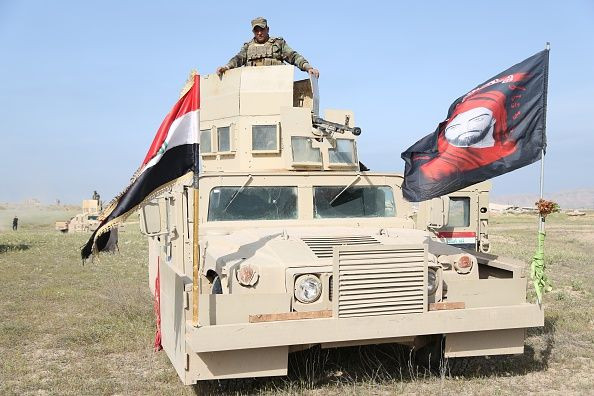Iraq Announces Mosul Operation, But Army Focuses On Liberating Last ISIS Oil Fields

The Iraqi government announced the launch of an operation to liberate Mosul, the headquarters city of the Islamic State group in the country, but the military is far from engaging in active battle there. Iraqi security forces and Kurdish troops are busy working with American advisers and Marines to take back the last of the oil fields held by the Sunni militant group near Makhmur, a city just 75 miles from the oil-rich municipality of Kirkuk.
Iraqi state-run television interrupted its morning programming Thursday with a series of news alerts announcing the operation. Based on media reports within the country, it is unclear what will be entailed in the operation to liberate Mosul or how long it will take.
#Iraq announced that ops to "retake Nineveh" began today, but forces are focused on pushing west from Makhmur, likely aiming to sever Hwy 1
— Miriam Goldman (@Miriam411) March 24, 2016
The U.S.-led coalition targeting the militant group aka either ISIL or ISIS dropped leaflets on Mosul this month, promising the civilians there they have not been forgotten and that they will be liberated. Before those people had a chance to see the leaflets, however, ISIS members forced them back into their homes and proceeded to collect all of the fallen paper, the Pentagon said.
Senior U.S. officials, such as Secretary of State John Kerry, have said the liberation of Mosul would take months. Prime Minister Haider al-Abadi has vowed to retake Mosul from ISIS this year, but U.S. Marine Corps Lt. Gen. Vincent Stewart, director of the Defense Intelligence Agency, told Congress last month, “I’m not as optimistic.”
Iraqi forces are attempting to take back oil fields under ISIS control just west of Makhmur in the Qayyarah subdistrict where the extremist group still produces tens of thousands of barrels of oil a day. If the militant group takes control of Makhmur, it would have access to a road that leads directly to Erbil, the capital of Iraqi Kurdistan.
ISF in #Makhmur launch op on #ISIS-held #Qayyarah, south of #Mosul, clearing several villages to its east. #Iraq pic.twitter.com/Agf88w4ywO
— Omar Al-Dulimi (@ODulimi) March 24, 2016
U.S. Marines newly deployed in Makhmur have been assigned to protect Iraqi units so they can secure the oil fields. There are now more than 3,200 U.S. military personnel in Iraq. Many have been tasked with training Iraqi soldiers, but others, such as the new contingent of Marines, are engaged either in active battles or in leading special operations to rescue hostages. Two American troops have died in Iraq since the U.S. deployed military personnel there last year.
The Iraqis need the U.S. advisers and Marines. During the past year, the combination of Iraqi security forces and Kurdish troops battled ISIS with a limited number of weapons and a limited amount of ammunition. But, recently, the U.S. supplied the combined forces with fresh ammunition, as well as artillery and tanks, to use in the next series of confrontations, including the fight for Mosul.
#Mosul offensive announced today is probably a mock operation. Expect a big offensive somewhere else, probably Manbij, Raqqa or DeirEzzor..
— Rami (@RamiAlLolah) March 24, 2016
The clock for the liberation of Mosul is ticking. The Mosul Dam is no longer in the hands of ISIS, but it requires serious restoration, and the United Nations has said it is at risk of failing.
Samantha Power, U.S. ambassador to the U.N., and Mohamed Alhakim, Iraq’s permanent representative at the U.N., held a briefing on the status of the Mosul Dam this month and said that in the event of a breach, a 45-foot-high wave potentially could scour everything in its path. The dam is a two-mile-long barrier that can hold back as much as 441 million cubic feet of water.
© Copyright IBTimes 2024. All rights reserved.





















